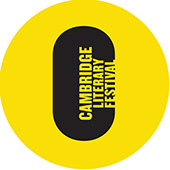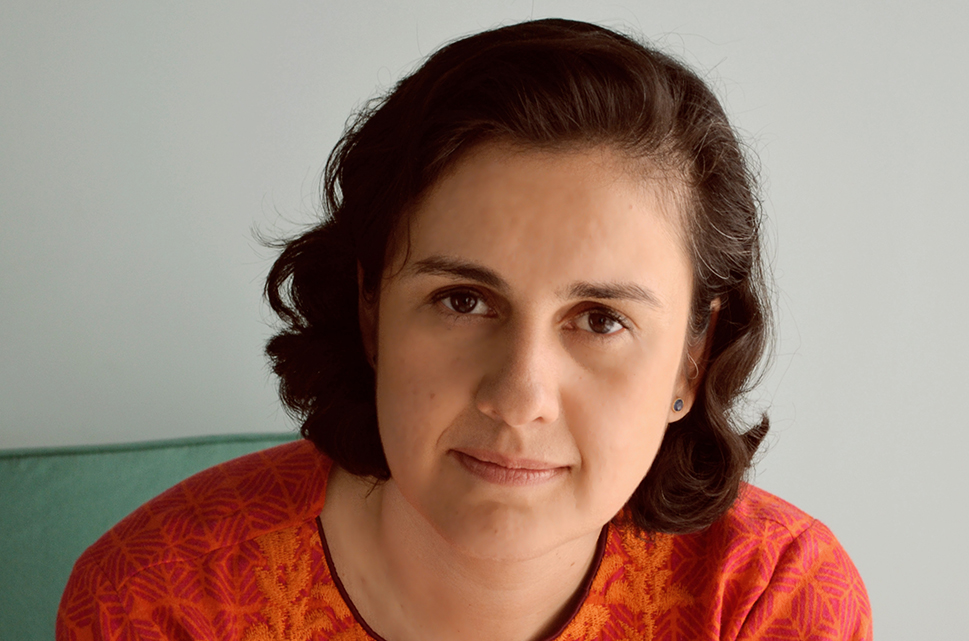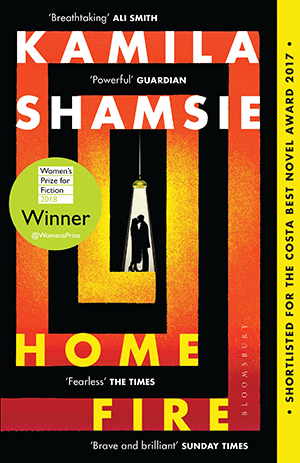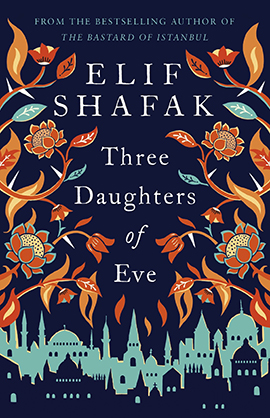Bringing you top new fiction picks, author interviews, discounts and lots more book chat, the Edition Book Club is a partnership with Cambridge Literary Festival and Heffers
Home Fire by Kamila Shamsie
The latest selection for our book club is by Kamila Shamsie, who spoke to Charlotte Griffiths

This time of year sees lovers of literature wading through endless lists of “summer reads” – and sitting atop many of them is Home Fire, the critically acclaimed latest novel from author Kamila Shamsie. Longlisted for the Booker and very recent winner of the Women’s Prize For Fiction, this short book is ideally suited to being read in a scorching heatwave: it’s an uncomfortable, unblinking, powerful read that will leave your mind racing – but my goodness, it’s worth your time.
The book follows three British Muslim siblings: Isma, the eldest sister, and twins Aneeka and Parvaiz, as they struggle to reconnect with one another, set against the shadow of politics, radicalisation, unblinking prejudice and unchangeable world events. Right from the off, , it’s clear that this tale has two faces: everyone seems to be going along with the status quo, or with the routes they see as inevitable, while also silently burning with white-hot frustration and fury at the situations they’ve been placed in.
Home Fire is a retelling of the Greek tragedy Antigone, and is the first time Kamila had worked on top of an existing story. “All writers are always drawing on other literary texts in some way, but this was the first time I’d done it in such a knowing fashion,” she said.

The idea to work with this ancient text arrived with Kamila by pure chance. “It was a conversation I had with a man called Jatinder Varma who runs Tara Arts Company in South London. I was between novels, and I wanted something to work on but had no ideas, and I got this email saying: “You don’t know who I am, but come in and have a coffee.’”
Kamila met with Jatinder, who suggested she could write a play – though the writer had no experience with creating a work for the stage, and told him so. “He said ‘I thought you’d say that – so why don’t you adapt a play? Something like Antigone, or The Oresteia, but in a contemporary Asian or British Asian context?’” Kamila had read Antigone at university, but couldn’t recall the tragedy besides (as in all Greek tragedies) that terrible things happened, so looked at the text with fresh eyes. “I was reading the play,” she said, “and it was at that moment when the newspapers were full of stories of young Brits going off to join Isis, and Theresa May, then Home Secretary, was stripping them of their citizenship. And I thought – this [Antigone] is this story. I didn’t have to work to think how it would become contemporary – I just knew.”
What started life as a play quickly became a book, retaining the five-act structure of traditional theatre to frame the tragic events, with each act seeing a different narrator pick up events from their perspective. “I was surprised how little of Antigone I had to throw away. That central line was just extraordinarily relevant. Right now, Antigone is the most performed play in the world, and I can see why: this figure of resistance to authority… the more we see of our democracy sliding into dark and awful things, the more we need Antigone to turn up and say ‘We’re going to stop this from happening.””

The book unsettles because of how close it skims to the bone on many fronts: primarily the parallels between Home Fire’s fictional Home Secretary Karamat Lone, and Sajid Javid – who rose to the same position after Home Fire’s publication in 2016, and who shares Conservative politics and a Pakistani-Muslim heritage with Shamsie’s character.
“When I first started to think about a Muslim Home Secretary, I wondered if anyone would buy it,” she said. “But then it was late 2014, and we had Sajid Javid, Sadiq Khan and Sayeeda Warsi, and they were all figures who could go further,” she said. “By the time I was finishing the first draft, the Zac Goldsmith and Sadiq Khan mayoral contest was going on – so when the book came out, everyone asked me if [Lone] was Sadiq Khan: but he was in the wrong role. I remember that moment when Theresa May was about to announce a new Home Secretary, and someone on Twitter wrote “Sajid Javid?” – and I just thought: oh, that’s SO weird. So now I have a deep interest in everything Sajid Javid does, that fall into the category of ‘things my guy would have said’ or ‘things my guy would not have said’!”.
Home Fire is ablaze with secrets: I ask if Kamila is good at keeping them herself, or if they sneak out into her characters. “Different writers have different takes on it: I’ve always felt really queasy about it,” she says. “If I have a conversation with someone and they drop a good line, then I’ll use that, but if there’s something that’s very personal to someone, then I tend to not go off and do things with it.”
The Home Fire siblings grow up in the Preston Road area of London: Kamila has friends who live there, and who walked her around the neighbourhood to get a sense of where the characters lived. “I then had a reading in the Preston Road Community Library, which appears in the book – and a lot of the people who I’d been chatting to before turned up again, so I got to tell them “Oh, I used your line, and your line” and so on.”
Born in Karachi, Pakistan, Kamila grew up in a family of writers stretching to four generations: her mother, grandmother and great grandmother were all published authors, so it seems almost inevitable that at some point Kamila would turn to creating books. “Your own life seems normal to you – at least mine did – and it wasn’t until later that I got to look back and realise how significant it was,” she said. “It wasn’t so much that I was growing up in a family of writers, as it being a family where books mattered, and were taken seriously – but there was never any pressure to [become a writer]. I just loved books from the start. When you grow up and the soundtrack of your life is your mother’s hands on the keyboard… I remember when she gave up her typewriter for a computer and the sounds of my life disappeared – the hammering on keys disappeared.”
“I have a terrible time writing in London,
because it’s full of distractions”
Kamila has been writing since she was eleven and produced her first four novels back to back. “One [book] would finish, and I would know the next one – but that is no longer the case,” she says. “I’m now that person who seems to require time off between them: there are no ideas, and then I get to a point where I feel so bored of not writing, and my brain feels pointless – and then a novel forces itself to happen. Though I have a terrible time writing in London because it’s full of distractions,” she laughs. “My first draft gets written somewhere else – I go back to my family’s home in Karachi every winter, and I write very well there, sitting out on the verandah looking at the garden cats… and there’s also a writing retreat in Tuscany where I’ve been going for about 15 years. And then revisions get done at my desk in London.”
Home Fire is an astonishing read: the complex layers of lies, of secrets, of deceit and subterfuge gradually burn away, until there is nothing left but the siblings themselves, their lives scorched by events whirling well beyond their control. The two short paragraphs of heart-stopping prose that mark the story’s conclusion left me open-mouthed in awe, and are still smouldering awkwardly in my memory long after finishing the book. If you only read one book this summer, make it Home Fire – you won’t regret it.
Book Club questions
“I’m very glad that book clubs exist!” Kamila said. “It’s hard when you’ve written a book to know how to talk about it. One of the nicest responses I’ve had was from a teacher who taught Home Fire to her class. She said that everyone had a different favourite character, or someone who they felt passionately for or against. Often with a book, everyone feels the same way, but with this there was such a range of responses.”
1. What do you think is the significance of the title?
2. How does the opening section – where Isma sits in Heathrow – make you feel?
3. Does Home Fire change your understanding of the British Muslim community?
4. Should Isma’s loyalty lie with her brother, or with her country?
Cathy Moore, director of Cambridge Literary Festival, on Home Fire
Kamila Shamsie is a great writer with seven novels under her belt. Her latest, Home Fire, is the deserving winner of the 2018 Women’s Prize for Fiction and her most assured. It plays to contemporary and universal themes of radicalisation, love and the conflicts of society, family, faith and politics whilst boldly re-working Sophoclese’s Antigone myth as the story of two British Muslim sisters and their jihadist brother.
Home Fire is up there with the best of literary thrillers and gathers momentum at a cracking pace which takes us from the suburban streets of Wembley and Holland Park to Islamic State-ravaged Raqqa.
Shamsie gives us an uncomfortable glimpse into the roots of radicalism and in particular jihadi recruitment and the devastation on families and loved ones. Unflinchingly good, this is a powerful novel with a breathtakingly tense finale. If you are as bereft as I was when you finish Home Fire you might try The Reluctant Fundamentalist or Exit West by Pakistani writer Mohsin Hamid, both of which I was compelled to read in one sitting.
Up next month: Three Daughters of Eve by Elif Shafak 
Next month we’ll be delving into Three Daughters of Eve, the latest novel by Turkish writer and academic Elif Shafak. Chosen to mark Banned Books Week 2018, which runs 23-29 September, it begins with Peri, making her way to a dinner party one spring evening in Istanbul – a night of luxury a far cry from her upbringing.
When her handbag is stolen her world shifts violently. She starts to doubt how she got here: a traumatic Istanbul childhood, student years in Oxford, the rebellious professor who led her and best friends Shirin and Mona to question everything – Islam, love, life, even God – and the scandal that tore them all apart. Over one desperate night she tries to make sense of a past she has tried to forget – but can we ever escape who we once were?
Join the conversation: share your thoughts on Three Daughters of Eve by tweeting us @cambsedition and hashtag #editionbookclub
IN ASSOCIATION WITH

GET 25{b486c5a37ab2d325d17e17d701cb2567b1ecd1814e8ceb33effa2a4f1f171d46} OFF CAMBRIDGE EDITION BOOK CLUB BOOKS AT HEFFERS BOOK SHOP ON TRINITY STREET

